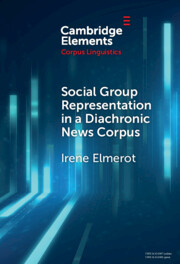Refine search
Actions for selected content:
3 results
7 - Change over Time
-
- Book:
- Applying Corpus Linguistics to Illness and Healthcare
- Published online:
- 05 September 2025
- Print publication:
- 25 September 2025, pp 101-117
-
- Chapter
-
- You have access
- Open access
- HTML
- Export citation
2 - Research Questions
-
- Book:
- Applying Corpus Linguistics to Illness and Healthcare
- Published online:
- 05 September 2025
- Print publication:
- 25 September 2025, pp 16-32
-
- Chapter
-
- You have access
- Open access
- HTML
- Export citation

Social Group Representation in a Diachronic News Corpus
-
- Published online:
- 06 February 2025
- Print publication:
- 06 February 2025
-
- Element
-
- You have access
- Open access
- HTML
- Export citation
